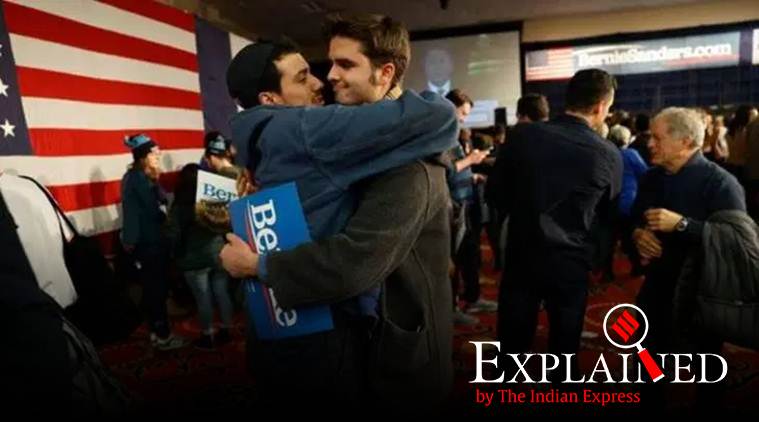Latest Comment
Post Comment
Read Comments
 Supporters of Democratic presidential candidate Senator Bernie Sanders embrace at his rally in Des Moines, Iowa, U.S., February 3, 2020. (Reuters Photo: Mike Segar)
Supporters of Democratic presidential candidate Senator Bernie Sanders embrace at his rally in Des Moines, Iowa, U.S., February 3, 2020. (Reuters Photo: Mike Segar)
On Monday, when results of the Democratic Party’s Iowa caucus were supposed to come in, chaos erupted as the results were delayed much beyond the usual early evening announcement. Even into early morning on Tuesday (Tuesday night India time), most news reports repeated “inconsistencies” were found in the Iowa Democratic Party’s reporting, primarily due to a mobile application failure. Now, the party is hurrying to get results out using a paper trail instead.
All this raises questions about the use of technology during polling, which is pertinent to India. Last month, 10 booths in Telangana piloted facial recognition to verify voters against their voter ID photographs, resulting in 65-86% accuracy, according to officials.
Why the uncertainty
From the most updated information coming in from the US, it seems reporting failures caused issues, not a hack.
Precinct chairs are the point persons to submit results (precincts can be described as voting districts). Multiple precinct captains reported difficulties using a mobile application meant for reporting the results. Some had even reported problems to the headquarters of the state party before the beginning of the caucuses, but the officials in charge did not provide the training to mend the issues. In addition, a backup hotline, the Iowa Democratic Party Caucus Hotline, put callers on hold for hours.
The Iowa Democratic Party held a conference call with various presidential campaigns on Monday night, telling them 35% of the precincts had been reported.
What app was used
The Iowa Democratic Party’s new mobile application was built by a company called Shadow Inc. Its work on the election was kept under wraps until now. The New York Times reported: “According to a person familiar with the app, its creators had repeatedly questioned the need to keep it secret, especially from the Iowa precincts where it would be used … [The person] said that there were concerns that the app would malfunction in areas with poor connectivity, or because of high bandwidth use, such as when many people tried to use it at the same time.”
The NYT quoted Sarah Banks, 39, a caucus secretary, as saying she had logged in to test the app on Monday with no problem, but when the time came to report the actual tallies at night, her app failed.
 Democratic presidential candidate former Vice President Joe Biden meets with attendees during a campaign event with the International Association of Bridge, Structural, and Ornamental Iron Workers, Sunday, Jan. 26, 2020, in Des Moines, Iowa. (AP Photo: Matt Rourke)
Democratic presidential candidate former Vice President Joe Biden meets with attendees during a campaign event with the International Association of Bridge, Structural, and Ornamental Iron Workers, Sunday, Jan. 26, 2020, in Des Moines, Iowa. (AP Photo: Matt Rourke)
So, who won?
Several candidates took the opportunity to declare themselves victorious on social media and rally speeches on Monday night. Mayor Pete Butteigieg gave a speech that seems to declare himself the frontrunner, while former Vice President Joe Biden discredited the entire process.
Republicans were quick to take advantage of the confusion. “Democrats are stewing in a caucus mess of their own creation with the sloppiest train wreck in history. It would be natural for people to doubt the fairness of the process,” Trump campaign manager Brad Parscale said in a statement.
How far Iowa matters
The Iowa caucus was already a controversial election point. Being the first gauge of voter sentiment, it claims to set the tone for the rest of the campaign. Jimmy Carter was launched into the spotlight from an Iowa win in 1976, as was Barack Obama in 2008.
However, several other chosen candidates (Ronald Reagan, George H W Bush, and Bill Clinton) did not win Iowa. Still, media and campaign trails give a large amount of attention to a state that is whiter, older, and far more rural than the rest of the country. The state is proud of the caucus system —which entails in-person town halls and debates —but others state it excludes those who would have only submitted through an absentee ballot.
📢 Express Explained is now on Telegram. Click here to join our channel (@ieexplained) and stay updated with the latest